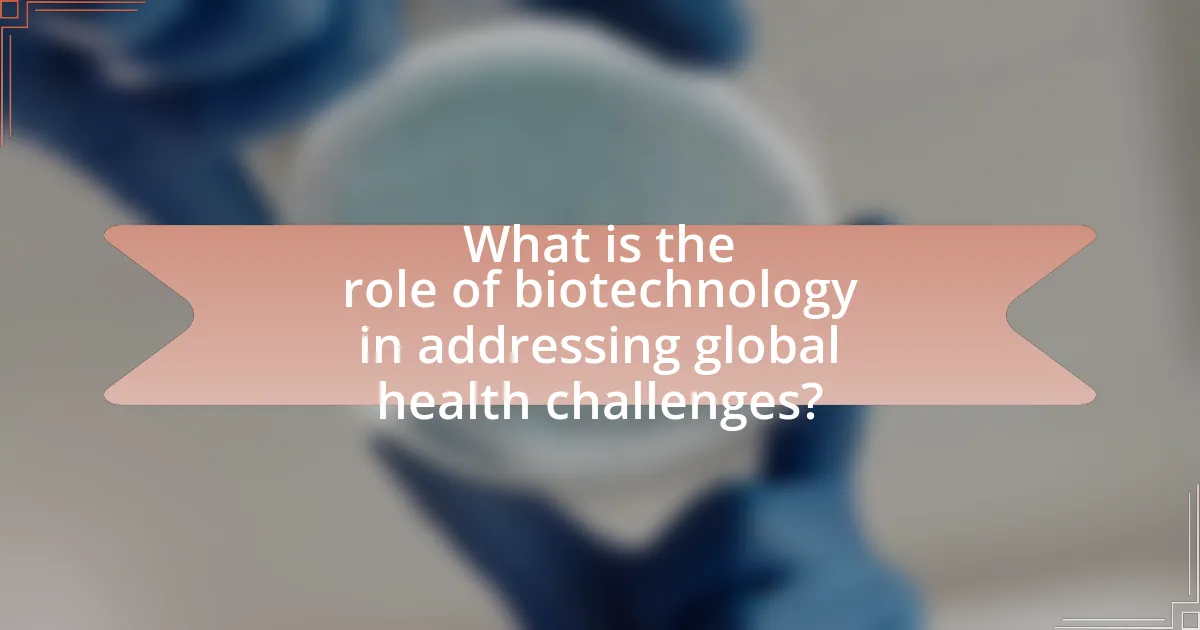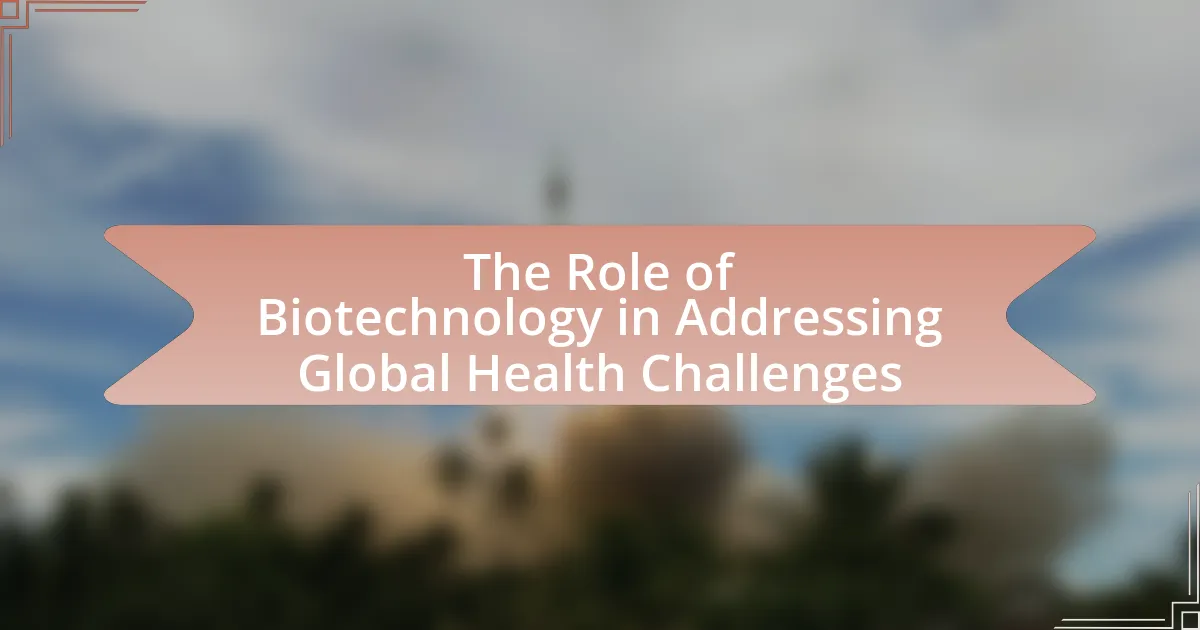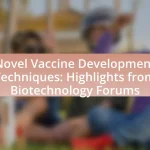Biotechnology is a vital field in addressing global health challenges, facilitating the development of innovative medical therapies, vaccines, and diagnostic tools. Key advancements include mRNA vaccines for COVID-19, which exemplify rapid response capabilities, and biopharmaceuticals like monoclonal antibodies that improve treatment outcomes for various diseases. The article explores how biotechnology contributes to disease prevention, enhances diagnostic accuracy, supports personalized medicine, and addresses health disparities. Additionally, it discusses ethical considerations, future trends, and best practices in biotechnological health interventions, highlighting its critical role in pandemic preparedness and global health initiatives.

What is the role of biotechnology in addressing global health challenges?
Biotechnology plays a crucial role in addressing global health challenges by enabling the development of innovative medical therapies, vaccines, and diagnostic tools. For instance, the rapid development of mRNA vaccines for COVID-19, such as those produced by Pfizer-BioNTech and Moderna, exemplifies how biotechnological advancements can lead to effective responses to pandemics. These vaccines were developed in record time, demonstrating the potential of biotechnology to enhance public health preparedness and response. Additionally, biotechnology facilitates the production of biologics, such as monoclonal antibodies, which are used to treat various diseases, including cancer and autoimmune disorders, thereby improving patient outcomes and healthcare efficiency.
How does biotechnology contribute to disease prevention and control?
Biotechnology contributes to disease prevention and control by enabling the development of vaccines, diagnostics, and therapeutics. For instance, recombinant DNA technology allows for the production of vaccines, such as the hepatitis B vaccine, which has significantly reduced infection rates globally. Additionally, biotechnology facilitates the creation of rapid diagnostic tests, such as PCR tests for COVID-19, which enhance early detection and containment of outbreaks. Furthermore, biopharmaceuticals, including monoclonal antibodies, provide targeted treatments for diseases like cancer and autoimmune disorders, improving patient outcomes and reducing disease prevalence. These advancements demonstrate the critical role of biotechnology in enhancing public health and controlling infectious diseases.
What are the key biotechnological methods used in vaccine development?
Key biotechnological methods used in vaccine development include recombinant DNA technology, mRNA technology, and viral vector technology. Recombinant DNA technology allows for the insertion of specific genes from pathogens into host cells, enabling the production of antigens that stimulate an immune response. mRNA technology, exemplified by the Pfizer-BioNTech and Moderna COVID-19 vaccines, utilizes synthetic mRNA to instruct cells to produce viral proteins, prompting an immune response without using live virus. Viral vector technology employs harmless viruses to deliver genetic material from pathogens into host cells, eliciting an immune response. These methods have been validated through successful vaccine development and deployment, significantly contributing to global health initiatives.
How do biotechnological innovations enhance diagnostic tools?
Biotechnological innovations enhance diagnostic tools by improving accuracy, speed, and the ability to detect a wider range of diseases. For instance, advancements in molecular diagnostics, such as PCR (Polymerase Chain Reaction), allow for the rapid identification of pathogens at the genetic level, significantly reducing the time needed for diagnosis from days to hours. Additionally, innovations like CRISPR-based diagnostics enable highly specific detection of genetic material, which increases sensitivity and reduces false positives. These improvements are supported by studies showing that molecular tests can detect infections with up to 90% accuracy, compared to traditional methods that may only reach 70%. Thus, biotechnological advancements are crucial in developing more effective diagnostic tools that can respond to global health challenges efficiently.
Why is biotechnology essential for developing new therapies?
Biotechnology is essential for developing new therapies because it enables the manipulation of biological systems to create innovative treatments. This field allows for the design of targeted therapies, such as monoclonal antibodies and gene therapies, which can address specific diseases at the molecular level. For instance, the development of trastuzumab (Herceptin) for HER2-positive breast cancer exemplifies how biotechnological advancements can lead to effective, personalized treatment options. Additionally, biotechnology facilitates rapid vaccine development, as seen with mRNA vaccines for COVID-19, showcasing its critical role in responding to global health challenges efficiently.
What types of biopharmaceuticals are produced through biotechnology?
Biopharmaceuticals produced through biotechnology include monoclonal antibodies, recombinant proteins, vaccines, and gene therapies. Monoclonal antibodies are engineered to target specific antigens, providing treatments for diseases like cancer and autoimmune disorders. Recombinant proteins, such as insulin and growth hormones, are produced using genetically modified organisms, ensuring a consistent and effective supply. Vaccines developed through biotechnology, like mRNA vaccines, have been pivotal in combating infectious diseases, notably during the COVID-19 pandemic. Gene therapies aim to treat genetic disorders by correcting defective genes, showcasing the transformative potential of biopharmaceuticals in modern medicine.
How does biotechnology facilitate personalized medicine?
Biotechnology facilitates personalized medicine by enabling the development of targeted therapies based on individual genetic profiles. This approach allows for treatments that are tailored to the specific genetic makeup of patients, improving efficacy and reducing adverse effects. For instance, the use of genomic sequencing technologies, such as next-generation sequencing, allows healthcare providers to identify mutations in genes associated with diseases, leading to personalized treatment plans. A study published in the journal Nature Reviews Genetics highlights that personalized medicine can significantly enhance treatment outcomes in conditions like cancer, where therapies can be designed to target specific genetic alterations in tumors.
What impact does biotechnology have on public health initiatives?
Biotechnology significantly enhances public health initiatives by enabling the development of advanced diagnostics, therapeutics, and vaccines. For instance, the rapid creation of mRNA vaccines for COVID-19, such as those developed by Pfizer-BioNTech and Moderna, showcases how biotechnological innovations can respond swiftly to emerging health threats. These vaccines demonstrated over 90% efficacy in preventing severe illness, illustrating biotechnology’s critical role in controlling infectious diseases. Additionally, biotechnology facilitates personalized medicine, allowing treatments to be tailored to individual genetic profiles, which improves patient outcomes and optimizes resource allocation in healthcare systems.
How does biotechnology support global health surveillance systems?
Biotechnology supports global health surveillance systems by enhancing the detection, monitoring, and response to infectious diseases. Advanced biotechnological tools, such as genomic sequencing and bioinformatics, enable rapid identification of pathogens, allowing for timely public health interventions. For instance, during the COVID-19 pandemic, genomic sequencing facilitated the tracking of virus mutations and spread, which informed vaccine development and public health strategies. Additionally, biotechnology aids in the development of diagnostic tests that provide accurate and quick results, further strengthening surveillance capabilities. These innovations collectively improve the ability to respond to health threats on a global scale.
What role does biotechnology play in addressing antimicrobial resistance?
Biotechnology plays a crucial role in addressing antimicrobial resistance by enabling the development of novel antimicrobial agents and alternative therapies. Through techniques such as genetic engineering, researchers can create new antibiotics that target resistant bacteria, as demonstrated by the discovery of teixobactin, a novel antibiotic derived from soil bacteria that shows effectiveness against resistant strains. Additionally, biotechnology facilitates the use of phage therapy, which employs bacteriophages to specifically target and kill antibiotic-resistant bacteria, providing a targeted approach to treatment. The application of CRISPR technology also allows for precise editing of bacterial genomes, potentially reversing resistance mechanisms. These advancements underscore biotechnology’s significant contribution to combating antimicrobial resistance and enhancing global health outcomes.
How can biotechnology address health disparities globally?
Biotechnology can address health disparities globally by enabling the development of affordable diagnostics, treatments, and vaccines tailored to diverse populations. For instance, biotechnological advancements have led to the creation of rapid diagnostic tests for diseases like malaria and tuberculosis, which disproportionately affect low-income countries. According to the World Health Organization, these innovations can significantly reduce the time to diagnosis and treatment, thereby improving health outcomes in underserved communities. Additionally, biotechnology facilitates the production of vaccines, such as those for COVID-19, using platforms that allow for rapid scaling and distribution, ensuring equitable access to life-saving interventions. This targeted approach not only addresses immediate health needs but also strengthens healthcare systems in regions facing significant health challenges.
What are the ethical considerations in biotechnological applications for health?
Ethical considerations in biotechnological applications for health include issues of consent, equity, and potential misuse of technology. Informed consent is crucial, as individuals must understand the implications of biotechnological interventions, such as gene editing or personalized medicine. Equity concerns arise regarding access to biotechnological advancements, which may exacerbate health disparities if only available to affluent populations. Additionally, the potential for misuse of biotechnological tools, such as in genetic discrimination or bioweapons development, raises significant ethical dilemmas. These considerations are underscored by frameworks like the Declaration of Helsinki, which emphasizes ethical principles in medical research involving human subjects.
What are the future trends in biotechnology for global health?
Future trends in biotechnology for global health include advancements in personalized medicine, gene editing technologies like CRISPR, and the development of biopharmaceuticals. Personalized medicine tailors treatments based on individual genetic profiles, improving efficacy and reducing side effects; for instance, targeted therapies in oncology have shown significant success in clinical outcomes. Gene editing technologies, particularly CRISPR, enable precise modifications to DNA, offering potential cures for genetic disorders and enhancing vaccine development, as evidenced by ongoing research in sickle cell disease and COVID-19 vaccines. Additionally, the rise of biopharmaceuticals, including monoclonal antibodies and biosimilars, is transforming treatment protocols for chronic diseases, with the global biopharmaceutical market projected to reach $500 billion by 2025, reflecting a growing reliance on biotechnological innovations to address health challenges.
How can emerging technologies improve health outcomes?
Emerging technologies can improve health outcomes by enhancing disease diagnosis, treatment, and prevention through innovations such as telemedicine, artificial intelligence, and wearable health devices. For instance, telemedicine allows patients to access healthcare remotely, increasing access to medical services, particularly in underserved areas. Artificial intelligence can analyze vast amounts of medical data to identify patterns and predict disease outbreaks, leading to timely interventions. Wearable health devices monitor vital signs in real-time, enabling proactive management of chronic conditions. According to a study published in the Journal of Medical Internet Research, telehealth services increased patient engagement and satisfaction, demonstrating a direct correlation between technology use and improved health outcomes.
What role will biotechnology play in pandemic preparedness?
Biotechnology will play a crucial role in pandemic preparedness by enabling rapid development of vaccines, diagnostics, and therapeutics. For instance, mRNA technology, utilized in COVID-19 vaccines, allows for swift vaccine design and production in response to emerging pathogens. This approach was demonstrated by the Pfizer-BioNTech and Moderna vaccines, which were developed and authorized for emergency use within months of the virus’s genetic sequence being published. Additionally, biotechnology facilitates the creation of advanced diagnostic tools that can quickly identify pathogens, thereby improving outbreak response times. The integration of genomic sequencing and bioinformatics in tracking viral mutations further enhances preparedness efforts.
What best practices should be followed in biotechnological health interventions?
Best practices in biotechnological health interventions include rigorous regulatory compliance, stakeholder engagement, and evidence-based methodologies. Regulatory compliance ensures that interventions meet safety and efficacy standards, as demonstrated by the FDA’s approval processes for biopharmaceuticals, which require extensive clinical trials and data analysis. Stakeholder engagement, involving collaboration with healthcare professionals, patients, and communities, enhances the relevance and acceptance of interventions, as seen in successful vaccine rollouts. Evidence-based methodologies, grounded in scientific research and clinical data, guide the development and implementation of interventions, ensuring they are effective and tailored to specific health challenges, such as the use of CRISPR technology in gene therapy for genetic disorders.


